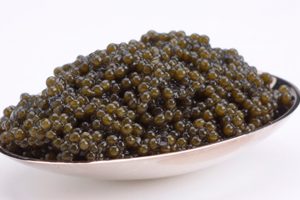
Officials Are Worried For Toxins In Caviar. Paddlefish, or spoonbill, caviar is emerging as a popular new delicacy; however, health officials are worried that a variety of toxins in the caviar—mercury, chlordane, and cancer-causing polychlorinated biphenyls, also known as PCBs—could be poisoning consumers. Due to harsh fishing restrictions in the Caspian Sea where Russian sturgeon is […]

Officials Are Worried For Toxins In Caviar. Paddlefish, or spoonbill, caviar is emerging as a popular new delicacy; however, health officials are worried that a variety of toxins in the caviar—mercury, chlordane, and cancer-causing polychlorinated biphenyls, also known as PCBs—could be poisoning consumers. Due to harsh fishing restrictions in the Caspian Sea where Russian sturgeon is obtained, connoisseurs are turning to the Mississippi paddlefish—found in the Mississippi River and its tributaries—as a good alternative.
But, according to an Associated Press (AP) report, “Kentucky, Indiana, and Tennessee have issued advisories warning consumers to limit their consumption of paddlefish caviar from portions of the Mississippi, Ohio, and Tennessee rivers.” Because the US Food and Drug Administration (FDA) does not require the river of origin to be listed on caviar labels, it is nearly impossible to determine from where the caviar was harvested.
Although some advocates of the caviar say the level of contaminants is below federal safety standards and consumers don’t generally eat enough of the caviar to become ill, others disagree. “If I were a consumer of that product, which I’m not, but if I were, I would want to know,” said U.S. Fish and Wildlife Service agent Paul Beiriger.
The fish can grow as large as 200 pounds and are also filter feeders. This means that the fish “collect plankton by swimming with their mouths open,” according to the AP. Feeding in this way, the fish ingest unusually large concentrations of many pollutants, said Rob Mottice, a paddlefish expert at the Tennessee Aquarium in Chattanooga. Commercial fishermen collect between five and 10 tons of Ohio River paddlefish annually.
Benjy Kinman, head of Kentucky’s fisheries program explained that some people may be aware of the warning, but others might not have heard anything about the growing problem. Also, some retailers may be unaware of the consumption advisories. For instance, Texas-based Whole Foods Market carries the delicacy, but was not aware of the problem and the food’s link to carcinogens. The market receives paddlefish caviar from a variety of rivers and Libba Letton, a spokeswoman for Whole Foods, said the company only learned of the consumption advisory after being contacted by The Associated Press; Whole Foods reports that the matter is now under its review.
The AP also reports that Kentucky wildlife officials are seeking authority to require caviar harvesters to provide them with sales information and is preparing to reissue its long-standing advisory warning that children and women of childbearing age should never eat the caviar, and that other healthy adults should eat it no more than six times a year. Tennessee officials went beyond a consumption advisory and banned all commercial fishing on a 30-mile stretch of the Mississippi River around Memphis after contaminants, including mercury and chlordane, were found in fish there.
The AP also reported that Linda Greer, health director for the Natural Resources Defense Council in New York, said, “There’s no safe level of exposure to a carcinogen,” adding, “My advice would be to err on the side of caution and not eat the paddlefish caviar.”
The personal injury attorneys at Parker Waichman LLP offer free, no-obligation case evaluations. For more information, fill out our online contact form or call 1-800-YOURLAWYER (1-800-968-7529).


